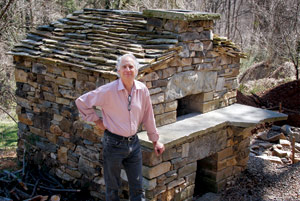"Living in the mountains encourages one to wander, every peak, every stream bed — a new experience. It is a complex ecosystem, compounded by elevation, exposure, soil, rock and rain. Western North Carolina is one of the richest natural environments worldwide. The Great Smoky Mountains are an International Biosphere Reserve. But, it is not just the geology of mountain and river(though these forces shape all other things), it is about the transformation that takes place after spending time here, it is about Mountain Alchemy."

This is a excerpt from Mark Rosenstein's blog, The French Broad: Lessons from an Appalachian Table. Rosenstein is a restaurant veteran of almost 40 years. Three of those four decades were spent owning and operating the Market Place, a stalwart of the Asheville restaurant scene, and one of the original champions of WNC's local, edible treasures. Rosenstein recently sold the restaurant, leaving him ample opportunity to dive into all manner of things that interest him.
Rosenstein is currently taken by the mountain-alchemy concept; it laces his writing and speech, and manifests itself in his food. But what is it, exactly? He and I spent a gorgeous, sunny afternoon sitting in his yard, the scent of early-blooming spring flowers floating through the breeze, the wind chimes tinkling, discussing just what mountain alchemy really means.
The thing is, the concept of mountain alchemy is somewhat ethereal, even though it does, says Rosenstein, belong to the earth. Mountain alchemy relates to the magic of the mountains that dominate our landscape. Those mountains, he says, have the power to transform us. "There is indeed a magic about them," Rosenstein says. "Western North Carolina has been a sacred place to lots of people over thousands of years." Geology, he says, defines culture.
"Fundamentally," he writes in The French Broad, "people shape and change the face of the earth through their culture. Humans change the earth and the earth shapes who we are — one changes the other and round again."
Rosenstein imagines himself to be a magician of sorts. Indeed, he says, when he found himself momentarily enthralled with the tarot in his younger days, "the magician was a card that appeared in my set of cards all the time." He expresses his magic through the kitchen, through his own alchemy. "Alchemy," Rosenstein explains, "is the power of transformation." The kitchen, he continues, is — and has always been — a center of alchemy. Whether the cook is fermenting, baking or distilling, something is being transformed.
Then, is mountain alchemy chemistry? In some ways it is, says Rosenstein — the chemistry of yeast causing bread to rise, for example. I recently watched him whip sweet potatoes and molasses into a light foam with the aid of liquid nitrogen; can mountain alchemy encompass molecular gastronomy?
"If I were 10 years younger," he says, "perhaps I would be devoting all of my energy into understanding that science. But I'm an emotional cook, not a scientist. There's an emotional side to alchemy, and I think some of the molecular chemistry takes the emotional and intuitive side out of things.
"I am," he says, laying his hand on his chest, "the instrument instead of a thermometer, a computer program or water bath."
Rosenstein is quick to point out that molecular gastronomy is a valid culinary discipline, and of some interest to him. "I spent a week with (molecular gastronomy pioneer) Hervé This and had my head cracked wide open, and I'm still picking up the pieces," he says, laughing. "The negative side to me, for that side of cooking, is that there is mystery in dirt. When you remove dirt from food, I think you remove some essential ingredients. And when I say dirt, I mean with a capital 'D': putting your hands in the dirt, growing things, the cycle of the seasons."
However progressive he gets with his own experimentation, Rosenstein maintains that there there's no uprooting his methods from tradition. He leads me over to a partially shaded area of his yard, presided over by tall trees, where he has built a wood-fired stone oven by hand and has begun to excavate the foundation for a potager — basically the forerunner of the modern stove, he says. "This is an investigation in heat," he says, gesturing toward the hole. "This is an investigation in primitive cooking."
This is mountain alchemy, then? It's part of it, says Rosenstein. It starts with the earth and passes through the food, which has the power to transform us. "Alchemy. How do we change things? How do we transform?" he asks. "It keeps spinning out from the idea of the table. The story that I'm trying to tell is how you can transform your life with daily things that have so much impact — the table, and sitting at the table, and how you get there."
Rosenstein is in the process of writing a book about native plants. Read more about mountain alchemy on his blog: www.thefrenchbroad.com.
Xpress food coordinator Mackensy Lunsford can be reached at food@mountainx.com.



Before you comment
The comments section is here to provide a platform for civil dialogue on the issues we face together as a local community. Xpress is committed to offering this platform for all voices, but when the tone of the discussion gets nasty or strays off topic, we believe many people choose not to participate. Xpress editors are determined to moderate comments to ensure a constructive interchange is maintained. All comments judged not to be in keeping with the spirit of civil discourse will be removed and repeat violators will be banned. See here for our terms of service. Thank you for being part of this effort to promote respectful discussion.